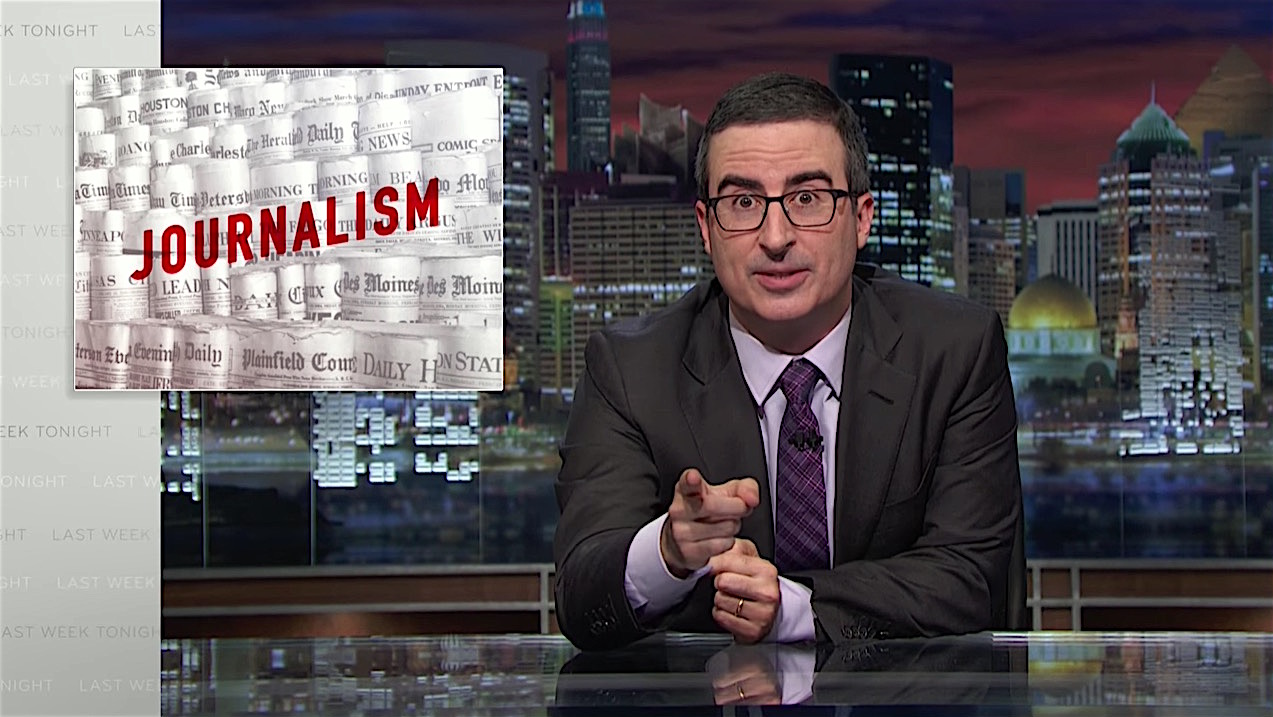John Oliver vividly paints a dystopian, clickbaity future of journalism, because of you


A free daily email with the biggest news stories of the day – and the best features from TheWeek.com
You are now subscribed
Your newsletter sign-up was successful
"The newspaper industry today is in big trouble," John Oliver said on Sunday's Last Week Tonight. "Papers have been closing and downsizing for years, and that affects all of us. Even if you only get your news from Facebook, Google, Twitter, or Arianna Huffington's Blockquote Junction and Book Excerpt Clearinghouse, those places are often just repackaging the work of newspapers." So are TV news shows, he said, and "even stupid shows like ours lean heavily on local papers. In fact, whenever this show is mistakenly called 'journalism,' it is a slap in the face to the actual journalists whose work we rely on."
"The media is a food chain that would fall apart without local newspapers," Oliver said, noting the pricing structure of online versus print ads and detailing the decline of great papers like The Oregonian, and the increased workload on the remaining reporters. "If journalists are constantly required to write, edit, shoot videos, and tweet, mistakes are going to get made," he said. "But here is where it gets frightening," Oliver said: When papers cut full-time statehouse reporters to focus on online content, and their leaders give in to "the temptation to gravitate toward whatever gets the most clicks," corruption can thrive.
"The truth is, publishers are desperate," Oliver said. "No one seems to have a perfect plan to keep newspapers afloat." And this is where all of us should probably squirm a bit. "The truth is, a big part of the blame for this industry's dire straits is on us, and our unwillingness to pay for the work journalists produce," Oliver said. "The longer that we get something for free, the less willing we are to pay for it — and I'm talking to you, the person watching this segment on YouTube using the WiFi from the coffee shop underneath your apartment." Look, he concluded, "sooner or later, we are either going to have to pay for journalism, or we are all going to pay for it." And "malfeasance run amok" is only one problem. He rewards your guilt trip with a darkly comic, depressingly plausible sendup of Spotlight that might just make you subscribe to your local paper. Or at least think about it. Watch below. Peter Weber
The Week
Escape your echo chamber. Get the facts behind the news, plus analysis from multiple perspectives.

Sign up for The Week's Free Newsletters
From our morning news briefing to a weekly Good News Newsletter, get the best of The Week delivered directly to your inbox.
From our morning news briefing to a weekly Good News Newsletter, get the best of The Week delivered directly to your inbox.

A free daily email with the biggest news stories of the day – and the best features from TheWeek.com
Peter has worked as a news and culture writer and editor at The Week since the site's launch in 2008. He covers politics, world affairs, religion and cultural currents. His journalism career began as a copy editor at a financial newswire and has included editorial positions at The New York Times Magazine, Facts on File, and Oregon State University.
